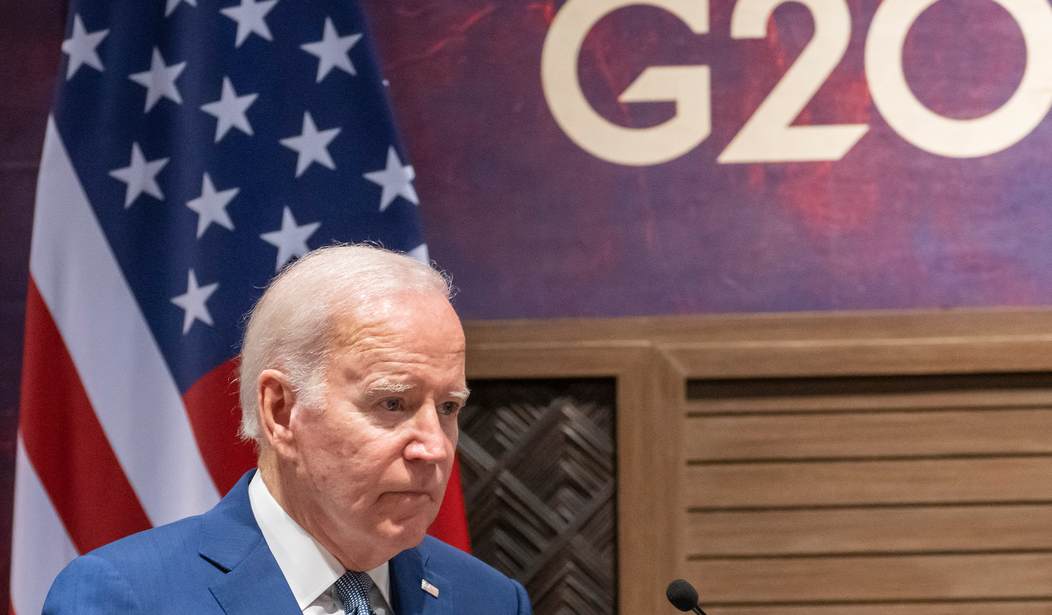On Nov. 9, while flummoxed Republicans were trying to figure out why their "Red Tsunami" didn't happen in this year's midterm elections, a buoyant Joe Biden held a White House news conference. His goal: change the subject. After meandering about looking forward to working constructively with Rep. Kevin McCarthy, Old Joe blamed a grueling international travel itinerary for why he had to leave town on Nov. 10 before all the votes were tallied.
On Nov. 11 (Veterans Day in the U.S., Remembrance Day in many other countries), our geriatric-in-chief was lauded at the United Nations Climate Change Conference in Egypt for his oft-repeated pledge: "No more drilling" in the USA. Joe and entourage then boarded his fossil-fueled Air Force One (accompanied by no less than seven other U.S. Air Force aircraft) and headed to Phnom Penh, Cambodia, for an Association of Southeast Asian Nations meeting and East Asia Summit on Nov. 12 and 13.
On arrival, our gaffe-prone president expressed his appreciation to Cambodian strongman, Prime Minister Hun Sen, with, "I want to thank the prime minister for Colombia's leadership as ASEAN chair." The White House claimed Biden's visit to the Cambodian capital was a success because he "reaffirmed the enduring U.S. commitment to the Indo-Pacific" and a rules-based international order in the South China Sea. Exactly what this means was not questioned by the so-called mainstream media before the boss jetted off to Bali, Indonesia, for the annual G20 gathering of Earth's 19 industrialized nations, plus the European Union.
The two-day (Nov. 15-16) G20 summit has been described by some as "the first global summit of the second cold war." But in fact, it is simply the venue for our president's much-ballyhooed one-on-one with Communist China's Xi Jinping. When the two men and their entourages met for more than three hours on Monday in an elaborately decorated luxury hotel ballroom, both Biden and Xi could claim to be victors in their recent domestic political contests. Xi's total triumph on Oct. 22 in the 20th National Congress of the Chinese Communist Chinese Party really did make Xi "president for life," with absolute authority to quash internal dissent. Biden's power -- based on the Republicans' underwhelming performance in the Nov. 8 midterm elections -- grants our chief executive no such supremacy, nor should it.
Recommended
Though it will take weeks to unwrap all the two leaders discussed, perhaps the most important outcome of the mini summit is a White House statement issued immediately after it wrapped up: "President Biden and President Xi reiterated their agreement that a nuclear war should never be fought and can never be won."
If true, and only time will tell, that's an important signal to Vladimir Putin and his saber-rattling about the use of nuclear weapons in his losing war against Ukraine. Notably, Biden raised the issue -- and our commitment to Taiwan -- during his 15-minute "press availability" after the meeting between he and Xi.
Biden appeared to have been much better prepared for this series of international meetings. He certainly had moments of cognitive disarray and physical frailty, but overall, his performance was predictable. When he returns home, honest reporters, columnists and analysts -- and there are some -- must determine how he will proceed on a host of post-election and post-summit details. A few "now what" examples:
What steps are you going to take to restore America's economy? What will you do to stem the nationwide crimewave threatening the lives, safety and property of every man, woman and child in America? More than 3 million human beings from nearly every country on Earth have invaded our country. What will you do about it?
























Join the conversation as a VIP Member